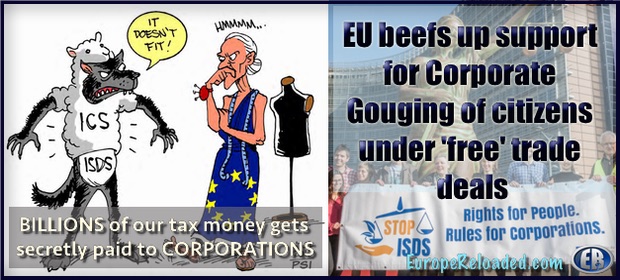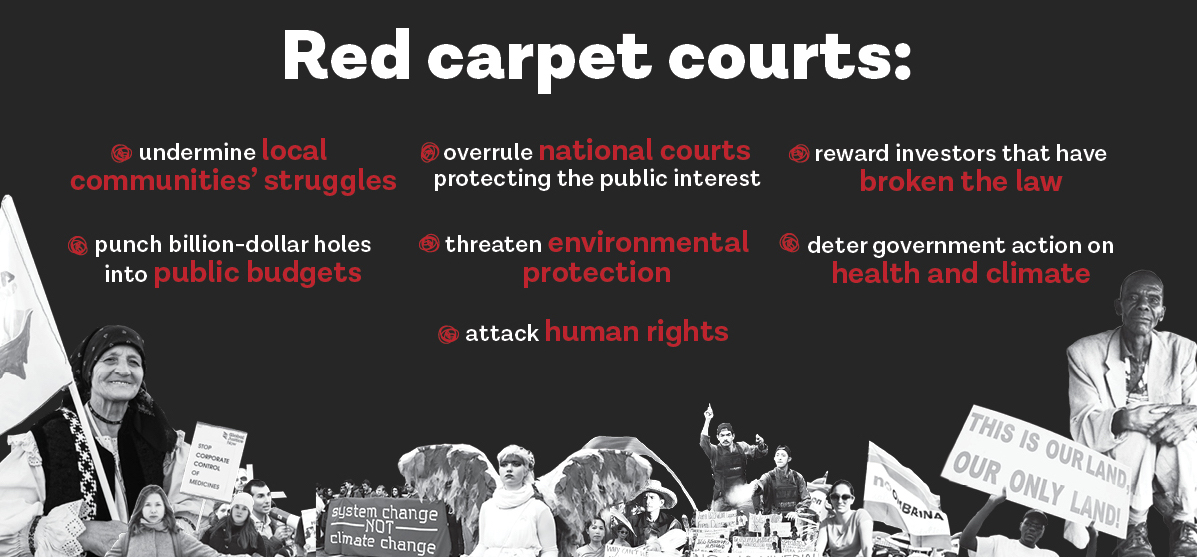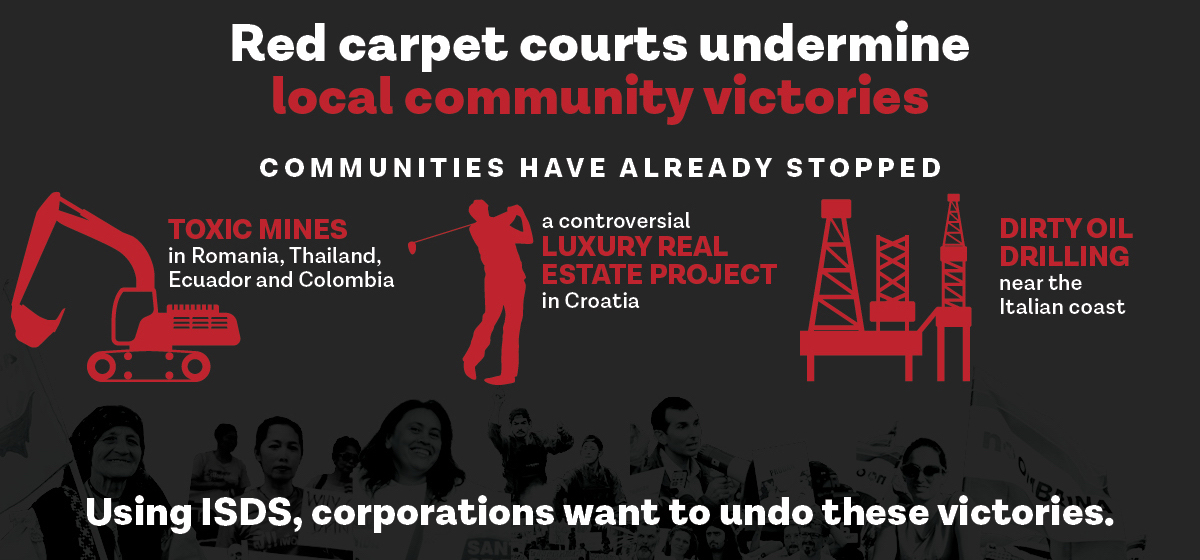
ER Editor: Readers may also be interested in this piece from April 30, 2019 titled EU’S top court rules corporate courts are compatible with EU law.
This – Investment Court System (ICS): The Wolf in Sheep’s Clothing – explaining the transition from ISDS (Investment State Dispute Settlement courts) to ICS (Investment Court System) in 2015:
In the words of EU trade chief, Cecilia Malmström, ISDS had become “the most toxic acronym in Europe”. In an attempt to diffuse this unprecedented response, the EC released
its new proposed Investment Court System in late 2015 – thus creating a new acronym (ICS).
The ICS has removed some of the worst excesses of ISDS. However, as this analysis reveals, it still leaves Europe desperately vulnerable to foreign corporate attacks. Currently only 1% of US-based investment is covered. ICS in the Trans-Atlantic Trade and Investment Partnership (TTIP) would increase this exposure from 1% to 100% – enabling a flood of legal cases against European governments. The inclusion of the ICS in the EU trade agreement with Canada (CETA) would expose European countries to corporate attacks from the 80% of USA multinationals who have a commercial presence in Canada. A massive increase from the current 1%.
The EU is promoting the ICS proposal as a new global standard. There is, however, no body of evidence that shows that investment courts create economic growth, particularly in developing countries. But they often harm fragile governments and undermine the development of independent legal systems in countries most in need.
This study shows that ICS is not judicially independent nor would it protect governments from having to pay compensation to corporations for making lawful, non-discriminatory laws to protect workers, health or the environment. Worryingly, collective bargaining agreements amongst social partners could become the target of law suits.
And citizen groups are still having to fight the EU to stop supporting the corporate rich and powerful who are milking and abusing them. Fancy that!
********
Red carpet courts: 10 stories of how the rich and powerful hijacked justice
CORPORATE EUROPE OBSERVATORY
Imagine an environmentally or socially destructive corporate project – say, a toxic mine, which could poison your local supply of water, or a luxury real estate project, which would displace hundreds of people in its neighbourhood. You and your community oppose the plans, the courts judge in your favour and the project is stopped. Seems like a community victory right? But then, the company behind the project sues your country for interfering with its profits, demanding millions or even billions in compensation, including for future profits.
→ Full report: Red carpet courts. 10 stories of how the rich and powerful hijacked justice
Actually, you do not need to imagine all this. It is the reality. Under the ISDS (investor-state dispute settlement) parallel justice system for corporations and the rich, companies can sue countries when they think that government decisions or court rulings – even ones whose explicit aim is to protect people or the environment – affect their profits. These lawsuits bypass domestic courts and take place before an international tribunal of arbitrators: essentially three investment lawyers who decide whether private profits or public interests are more important.
It’s litigation terrorism.
Nobel Prize-winning economist Joseph Stiglitz
For example, after Colombia’s Constitutional Court banned mining activities in a sensitive ecosystem which provides drinking water for millions of Colombians, Canadian mining company Eco Oro sued the country for US$764 million in damages. When Croatian courts cancelled illegal permits issued for a luxury golf resort in the city of Dubrovnik, Croatia was hit with a US$500 million compensation claim. Romania is defending itself from a shocking US$5.7 billion claim by Canadian mining company Gabriel Resources, after the country’s courts declared the company’s proposed toxic Roşia Montană gold mine illegal.
These are just three out of ten noteworthy but also representative ISDS lawsuits described in more detail in this report, which have been filed, threatened or decided since 2015. Globally, almost 1,000 ISDS cases are known of to date, in which governments have been sued for more than US$623 billion in total. This figure is equivalent to 90 per cent of all Foreign Direct Investment flows to all developing countries in 2018. The total amount of money which states have thus far been ordered or agreed to pay in disclosed ISDS rulings and settlements is US$88 billion.

These lawsuits are happening at a critical moment for the ISDS regime. On the one hand, strong public controversy about the ‘corporate courts’ has kept citizens, politicians and the media engaged, interested and critical on the issue. Also, a number of countries have started to pull out of the regime by terminating ISDS deals.
On the other hand, new trade and investment agreements which include ISDS provisions are under negotiation in many parts of the world, and the European Union (EU) is actually planning to scale-up ISDS through a World Court for Corporations (formally known as Multilateral Investment Court). These developments risk further expanding, locking-in and re-legitimising a much-criticised system that has proven extremely dangerous for taxpayers, democracy, social and environmental protection, economic development and climate justice.
ISDS has morphed from a rarely used last resort… into a powerful tool that corporations brandish ever more frequently, often against broad public policies that they claim crimp profits.
Journalist Chris Hamby
Against this background, this report shows that ISDS is again and again used as a corporate weapon against the public interest, and in spite of the ongoing controversy about it, these red carpet courts for corporations continue to thrive and reinforce injustice across the world. This parallel legal system continues to deliver hundreds of millions or even billions of dollars of taxpayers’ money to companies and rich individuals. ISDS cases, or just a risk thereof, regularly succeed in intimidating nations into gutting their own laws, thus deeply undermining democracy and citizen engagement around the world. Many cases also show how ISDS directly contradicts and obstructs other legal fields, most notably human rights and environmental law.

The latest EU approach to corporate rights does not do anything to put an end to this or address the many concerns and critiques of the system of EU citizens. In fact, alarmingly, its impact is quite the opposite: under the EU’s reformed ISDS (renamed Investment Court System or ICS) and the proposed Multilateral Investment Court, thousands of companies could continue to circumvent domestic courts and sue governments in an exclusive justice system if any national laws or regulations interfere with their ability to make huge profits. The EU’s ISDS policy would still pave the way for billions of taxpayers’ money being paid to big business and the rich. It could still curtail and undermine policymaking in the public interest, to protect people and the planet. And it could still lead to rulings that directly contradict human rights and environmental law.
As the EU embarks on a crusade to globalise its ISDS approach, this should not just alarm Europeans. From Mexico to Vietnam, from North America to the African, Caribbean and Pacific group of states, citizens and policymakers across the world should realise that the EU has not resolved the deep-seated problems with ISDS, which came under such serious critique in recent years. Instead, the latest investment protection proposals are just as dangerous for taxpayers, policies in the public interest, and democracy as the ‘old’ ISDS system – and as much a one-way system with only rights and lucrative possibilities, but no obligations for investors. These red carpet courts for corporations should have no space in any international agreement.
10 case studies of how the rich and powerful hijacked justice:
- Suing to force through a toxic goldmine: Gabriel Resources vs Romania
- How Big Pharma sabotaged the struggle for affordable cancer treatment: Novartis vs Colombia
- Bypassing courts and local democracy to build a gated community for the rich: Razvoj Golf and Elitech vs. Croatia
- Destructive mining trumps local health and environment: Kingsgate vs Thailand
- Blocking climate change laws with ISDS threats: Vermilion vs France
- Undermining indigenous land rights and perpetuating colonial wrongs: Border Timbers and von Pezold vs Zimbabwe
- When arbitrators reward mining corporations’ human rights abuses: Copper Mesa vs Ecuador
- Making profits but refusing to pay taxes: ConocoPhillips and Perenco vs Vietnam
- Dirty oil attacks action on fossil fuels: Rockhopper vs Italy
- Golden profits undermine people’s right to clean water: Eco Oro vs Colombia
************
Original article

••••
The Liberty Beacon Project is now expanding at a near exponential rate, and for this we are grateful and excited! But we must also be practical. For 7 years we have not asked for any donations, and have built this project with our own funds as we grew. We are now experiencing ever increasing growing pains due to the large number of websites and projects we represent. So we have just installed donation buttons on our websites and ask that you consider this when you visit them. Nothing is too small. We thank you for all your support and your considerations … (TLB)
••••
Comment Policy: As a privately owned web site, we reserve the right to remove comments that contain spam, advertising, vulgarity, threats of violence, racism, or personal/abusive attacks on other users. This also applies to trolling, the use of more than one alias, or just intentional mischief. Enforcement of this policy is at the discretion of this websites administrators. Repeat offenders may be blocked or permanently banned without prior warning.
••••
Disclaimer: TLB websites contain copyrighted material the use of which has not always been specifically authorized by the copyright owner. We are making such material available to our readers under the provisions of “fair use” in an effort to advance a better understanding of political, health, economic and social issues. The material on this site is distributed without profit to those who have expressed a prior interest in receiving it for research and educational purposes. If you wish to use copyrighted material for purposes other than “fair use” you must request permission from the copyright owner.
••••
Disclaimer: The information and opinions shared are for informational purposes only including, but not limited to, text, graphics, images and other material are not intended as medical advice or instruction. Nothing mentioned is intended to be a substitute for professional medical advice, diagnosis or treatment.




